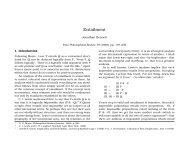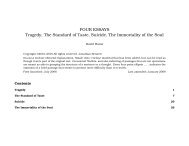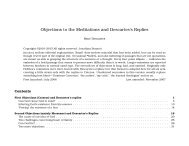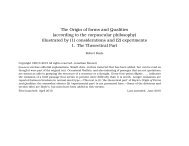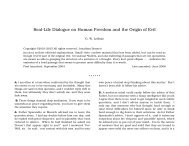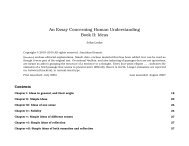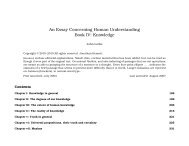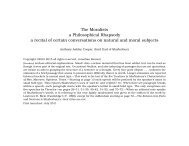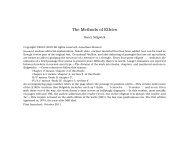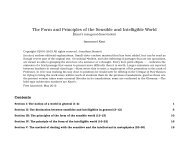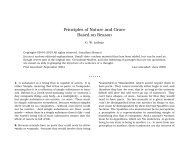A Vindication of the Rights of Woman with - Early Modern Texts
A Vindication of the Rights of Woman with - Early Modern Texts
A Vindication of the Rights of Woman with - Early Modern Texts
Create successful ePaper yourself
Turn your PDF publications into a flip-book with our unique Google optimized e-Paper software.
The <strong>Rights</strong> <strong>of</strong> <strong>Woman</strong> Mary Wollstonecraft 12: National education<br />
<strong>the</strong>m. •There are affections amongst children that are unlike<br />
<strong>the</strong> affection a child may have for his parents, and a child<br />
needs practice in <strong>the</strong> former, because ‘in youth <strong>the</strong> seeds<br />
<strong>of</strong> every affection should be sown’. •A frank openness <strong>of</strong><br />
speech and feeling is possible between child and child but<br />
not between child and parent; and this matters because<br />
it ‘first opens <strong>the</strong> heart to friendship and confidence’ and<br />
leads on to ‘more expansive benevolence’. •A little fur<strong>the</strong>r<br />
down she levels a fur<strong>the</strong>r charge against home-schooling:<br />
it leads to <strong>the</strong> children’s acquiring ‘too high an opinion <strong>of</strong><br />
<strong>the</strong>ir own importance’, to <strong>the</strong>ir ‘being allowed to tyrannize<br />
over servants’, and to <strong>the</strong>ir becoming ‘vain and effeminate’<br />
because <strong>the</strong>y are treated like men when <strong>the</strong>y are still boys’.<br />
[Considerations like <strong>the</strong>se, MW says, have affected her<br />
former preference for private education; and yet she still has<br />
that preference, because:] I still think that schools as <strong>the</strong>y<br />
are now regulated are hot-beds <strong>of</strong> vice and folly, and that <strong>the</strong><br />
only knowledge <strong>of</strong> human nature that could be learned from<br />
<strong>the</strong>m is merely cunning selfishness.<br />
[She now holds forth strenuously against <strong>the</strong> schools:<br />
at <strong>the</strong>m ‘boys become gluttons and slovens’, and rush into<br />
<strong>the</strong> libertinism that ‘hardens <strong>the</strong> heart as it weakens <strong>the</strong><br />
understanding’. Children at boarding-schools spend at least<br />
‘half <strong>of</strong> <strong>the</strong> time’ longing for vacations, and when <strong>the</strong>se come<br />
‘<strong>the</strong>y are spent in total dissipation and beastly indulgence’.<br />
A little fur<strong>the</strong>r on she refers to ‘<strong>the</strong> system <strong>of</strong> tyranny and<br />
abject slavery that is established among <strong>the</strong> boys’.]<br />
The only way to avoid two extremes that are equally harmful<br />
to morality would be to contrive some way <strong>of</strong> combining<br />
a public and private education. Thus to make men citizens,<br />
two natural steps might be taken that seem to lead directly<br />
to <strong>the</strong> desired point: cultivating <strong>the</strong> domestic affections that<br />
first open <strong>the</strong> heart to <strong>the</strong> various modifications <strong>of</strong> humanity,<br />
while also allowing <strong>the</strong> children to spend great part <strong>of</strong> <strong>the</strong>ir<br />
94<br />
time on terms <strong>of</strong> equality <strong>with</strong> o<strong>the</strong>r children. [MW follows<br />
this up <strong>with</strong> a lyrical reminiscence <strong>of</strong> ‘a country day school’,<br />
whose pupils had <strong>the</strong> desirable daily mixture <strong>of</strong> childhood<br />
friends and family influence. She contrasts this fiercely <strong>with</strong><br />
<strong>the</strong> evils <strong>of</strong> ‘close confinement in an academy near London’,<br />
ending <strong>with</strong> ‘. . . to say nothing <strong>of</strong> <strong>the</strong> slavery to forms that<br />
makes religion worse than a farce’. This launches her on<br />
an attack first on religious services in schools and <strong>the</strong>n<br />
cutting <strong>with</strong> a wider swa<strong>the</strong> through religious practices more<br />
generally.]<br />
·A DIATRIBE AGAINST RELIGIOUS PRACTICE IN ENGLAND·<br />
What good can be expected from <strong>the</strong> youth who receives<br />
<strong>the</strong> sacrament <strong>of</strong> <strong>the</strong> Lord’s supper so as to avoid paying<br />
a fine? Half <strong>the</strong> employment <strong>of</strong> <strong>the</strong> youths is to elude <strong>the</strong><br />
necessity <strong>of</strong> attending public worship; and well <strong>the</strong>y may, for<br />
such a constant repetition <strong>of</strong> <strong>the</strong> same thing must be a very<br />
irksome restraint on <strong>the</strong>ir natural vivacity. These ceremonies<br />
•have <strong>the</strong> most fatal effect on <strong>the</strong>ir morals,<br />
•are a ritual performed by <strong>the</strong> lips when <strong>the</strong> heart and<br />
mind are far away, and<br />
•are no longer stored up by our ·Protestant· church<br />
as a bank to draw on for <strong>the</strong> fees <strong>of</strong> <strong>the</strong> poor souls in<br />
purgatory;<br />
so why shouldn’t <strong>the</strong>y be abolished?<br />
[This next paragraph is addressed to <strong>the</strong> situation <strong>of</strong> any school or college<br />
which was founded by someone who provided a financial endowment and<br />
laid down rules for how <strong>the</strong> institution was to be run. There were and<br />
still are many <strong>of</strong> <strong>the</strong>se.]<br />
But in this country <strong>the</strong>re is a fear <strong>of</strong> any innovation. This<br />
hidden fear is really <strong>the</strong> apprehensive timidity <strong>of</strong> idle slugs<br />
who guard <strong>the</strong> snug place that <strong>the</strong>y view as an hereditary<br />
estate—eating, drinking and enjoying <strong>the</strong>mselves instead <strong>of</strong><br />
fulfilling <strong>the</strong> duties (except a few empty forms) for which <strong>the</strong><br />
‘estate’ was endowed. How do <strong>the</strong>y guard it? By sliming



